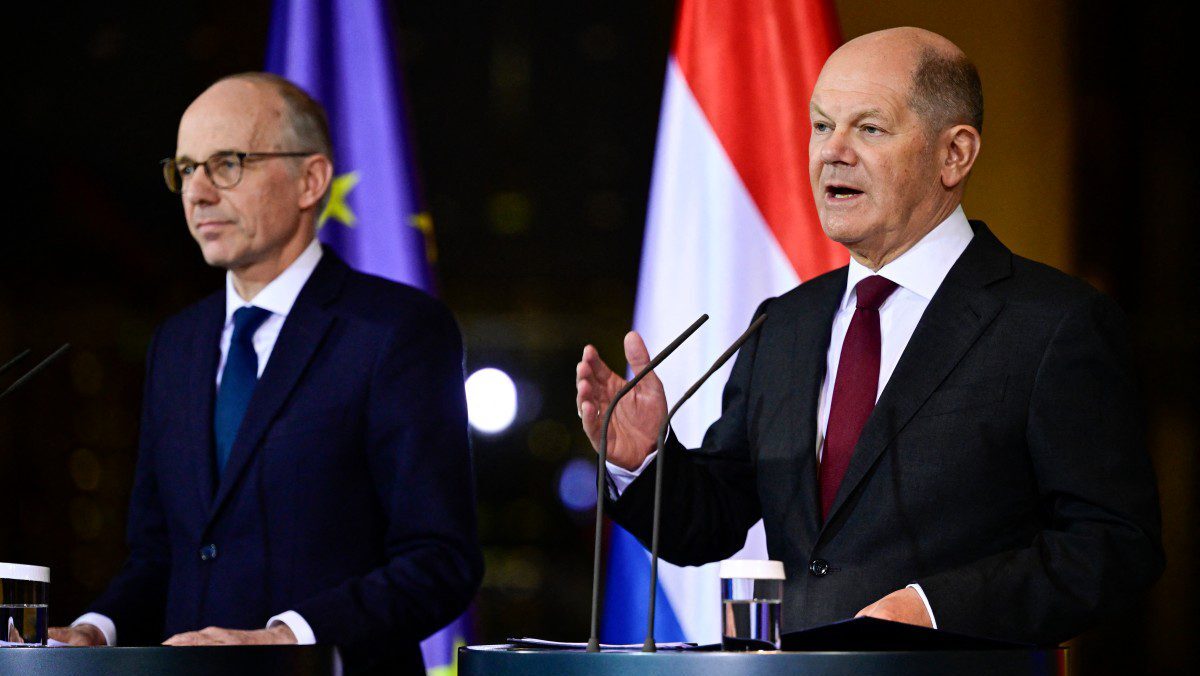
German Chancellor Olaf Scholz and Luxembourg’s Prime Minister Luc Frieden hold a joint press conference at the Chancellery in Berlin on January 8th, 2024.
Photo: JOHN MACDOUGALL / AFP
In an uncharacteristically frank manner, on Monday, German Chancellor Olaf Scholz berated the majority of European Union member states for not sending sufficient military hardware to an ailing Ukraine.
With delays to further American aid caused by U.S. congressional disunity coupled with Russia’s strategy of attrition warfare seemingly paying off, Scholz is stressing the need for the EU to step up. Whether this new, tougher look for Scholz will gain any political traction remains to be seen.
Late last year, Scholz’s government doubled its military aid to Ukraine to €8 billion, making Germany one of Ukraine’s top suppliers in 2024. Yet this will not be sufficient to give Ukraine the edge over Russia.
“As significant as the German contribution is,” Scholz said at a press conference with Luxembourg’s Prime Minister Luc Frieden in Berlin, “it will not be enough to ensure Ukraine’s long-term security.”
“Therefore I call on allies in the European Union to strengthen their efforts regarding Ukraine. The planned weapons deliveries to Ukraine of most EU member states are not enough,” he added.
To that end, he demanded that the EU compile a list composed of each member country’s “concrete contribution” for this year, giving as a deadline the emergency summit of EU leaders on February 1st.
The chancellor expressed confidence that, at that summit, the bloc would agree to its proposed €50 billion aid package for Ukraine. An earlier attempt to strike such a deal failed at last December’s EU summit due to Hungary’s opposition.
While no country was singled out, experts suspect that Scholz might have had France, Italy, and Spain in mind which, despite their relatively large economies, have not been as generous in their military aid.
According to the Kiel Institute, which keeps track of the military aid Ukraine receives from its allies, Germany, after the U.S., was the second-highest donor last year, with €17.1 billion. It was followed by the U.K. (€6.6 billion) and by Nordic and Eastern EU countries.
In comparison, France has only contributed €0.54 billion, Italy €0.69 billion, and Spain €0.34 billion.
Scholz’s call comes despite his previous hesitation toward arms support. Early last year, for example, Scholz finally gave the green light to the delivery of Leopard 2 tanks, but only after months of dithering over the move, earning him the disapproval of his U.S. and European allies.
At home, Scholz is also under pressure to expand Germany’s support for Ukraine with Taurus cruise missiles. Last weekend, both his coalition partners, the Greens and the FPD,as well as opposition party CDU, called on the chancellor to do so.
As he did with the Leopard 2 tanks, Scholz is postponing making a commitment, citing the risk of such missiles (which have a 500 kilometer range) being used by Ukraine to strike deep into Russian territory, which might trigger an escalatory response from Moscow. The U.S. has frequently explained its own refusal to supply Ukraine with Taurus missiles by using the same logic.
Whether upon Scholz’ urging alone, fellow EU member states cough up and just volunteer their planned military contribution for the whole year to Brussels is doubtful.
